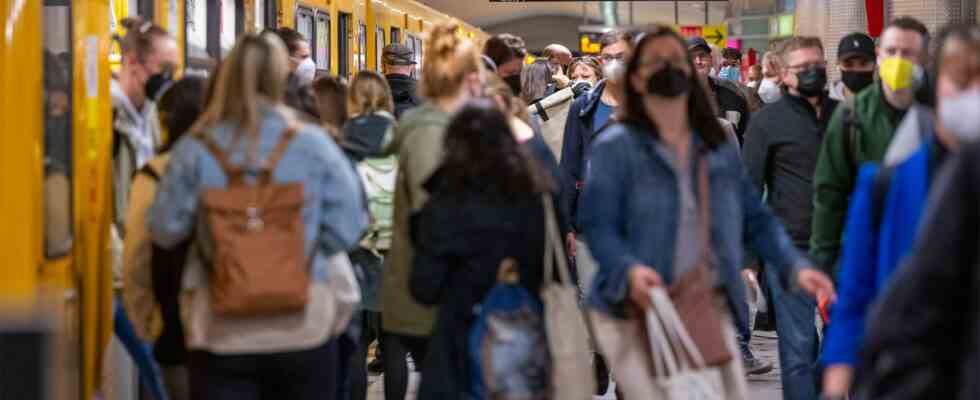FAQ
Status: 10/12/2022 07:31 a.m
The federal and state governments have basically agreed on a successor model for the 9-euro ticket. The only argument is about money. What do the states demand, what does the federal government offer – and why is it all taking so long?
the initial situation
Everything has actually been clarified: the federal and state governments want a successor model for the 9-euro ticket in local public transport. The only problem is: Who pays how much? Here the transport ministers of the federal states are at odds with the federal government. A working group was commissioned to present results by October 12th, i.e. by the next conference of transport ministers. That is today.
What does the federal government offer?
The traffic light coalition in the federal government has agreed to provide 1.5 billion euros annually for a nationwide local transport ticket – if the states give at least as much. Normally, regionalization funds of 9.4 billion euros come from Berlin this year, plus another billion from another pot. The federal government gives the federal states billions in financial support for local transport in the form of so-called regionalization funds, which the federal states and transport associations use to order services from transport providers.
In July he was still laughing: Federal Transport Minister Wissing shows his 9-euro ticket
Image: dpa
What are the countries asking for?
The federal states are willing to bear their share of the costs, but they generally insist on more money from the federal government for buses and trains. On the one hand, they want a structural increase in regionalization funds by 1.5 billion euros this year, and on the other hand, an additional 1.65 billion euros each in 2022 and 2023 due to the massive increase in energy prices. Rural areas should also be better connected in this way. “Where there is no train, where there is no bus, the cheap ticket is of no use to us,” said Brandenburg’s department head Guido Beermann (CDU). In the discussion, not only one ticket model should be brought to the fore, affirmed Saarland’s Prime Minister Anke Rehlinger. Public transport needs to be expanded. “What use is the cheap bus that ultimately doesn’t drive,” says Rehlinger.
What is the goal?
On January 1, 2023, there should be a permanently inexpensive local transport ticket that is valid nationwide. How cheap is unclear. In any case, it should probably cost more than nine euros a month. A range between 49 and 69 euros per month is probably realistic. Berlin has already submitted and launched a 29-euro ticket. It is valid from October to December for 29 euros per month throughout the city. But not for Brandenburg. Other transport associations are also planning in this direction, such as the Hamburger HVV. There could be a 49 euro ticket here.
The “Rheinische Post” reports that the transport ministers have agreed on a 49-euro ticket. Accordingly, the offer planned under the name “Klimaticket Deutschland” should be valid nationwide in local public transport. “It is personalized and non-transferrable,” the newspaper quoted from the key issues paper. The ticket should be offered both digitally and analogously. However, the date of introduction still depends on an agreement on the financing.
What are environmentalists and associations demanding?
The environmental organization Greenpeace campaigns for a 29-euro ticket for local transport. According to a study, it would cost the state no more than a 49-euro variant, and it would relieve households that are particularly affected by inflation. According to a Greenpeace calculation, a ticket for 29 euros per month would cost the state at most as much in subsidies as a 49-euro ticket due to twice the sales figures. Presumably, even lower co-payments were incurred for the cheaper ticket. Among other things, five surveys on the willingness to buy different ticket variants were evaluated for the calculation.
The managing director of Alliance pro rail, Dirk Flege, also called for an urgent successor solution. “It is just as important as securing financing for the follow-up ticket to agree in principle on significantly increasing the regionalization funds for public transport and investing more in the rail network.” The money is there, it just needs to be reallocated.
the German environmental aid called on the transport ministers to decide on a nationwide 365-euro ticket. The federal government would have to bear the associated costs of four billion euros. In addition, federal states and local authorities needed billions in aid for the long overdue expansion of public transport. Of the Federation for the Environment and Nature Conservation Germany (BUND) emphasized that Germany can only achieve the climate goals with well-developed public transport with cheap and simple tariffs.
the Federation of Consumers (vzbv) is calling for a nationwide 29-euro ticket – with discounts for people on low incomes. At the same time, politicians must “save more money for a better infrastructure and more offers”.

